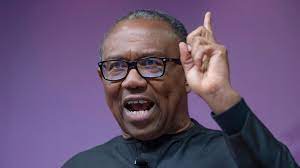By Ade Martins-
The Nigerian Labour Part’s third-party candidate in the country’s tightly contested presidential election has caused a major upset by achieving the city of Lagos.
The Labour Party’s Peter Obi narrowly defeated the ruling party’s Bola Tinubu in his heartland, results announced by state election officials show.
This is the first time since 1999 that a party backed by Mr Tinubu, a two-time Lagos governor, has not won the state, expressing a surprisingly high support for Obi in a state that was expected to vote Tinubu.
Tinubu has bene credited for substantially improving the hub of Lagos during his time as governor, but the inhabitants of Lagos clearly expressed a preference for Obi, whose impressive track record turned a majority of heads in the important city of Lagos.
However, a number of states do not fancy having Obi as their president.
Mr Tinubu has already won three of the five other states declared so far, including his south-western strongholds of Ondo, Ekiti and Kwara, narrowly losing to Atiku Abubakar of the main opposition Peoples Democratic Party (PDP) in Osun state.
Atiku Abubakar has also narrowly won the presidential election in Katsina, the home state of outgoing President Muhammadu Buhari.
There are still 30 states outstanding to declare, including the capital, Abuja to declare, making it far too early to determine who might be elected Nigeria’s next president.
The results from Ekiti, Kwara, Ondo and Osun have all been confirmed by the head of the Independent National Electoral Commission (Inec) at its headquarters in the capital, Abuja, however the other results remain provisional.
There have been delays in getting results from the states and the capital, Abuja, due to several reasons, including multiple allegations of ballot snatching conducted by thugs and technical issues associated with the electoral commission’s viewing page on its website
The delays have been partly attributed to the election continuing for a second day in parts of the country.
The election on Saturday saw voting start several hours late in many areas, and also attacks on some polling stations.
Over 87 million people were eligible to take part, making it the biggest democratic exercise in Africa.
The ruling All Progressives Congress (APC) and the PDP have dominated Nigeria since the end of military rule in 1999 but this time, Mr Obi from the previously little known Labour Party has mounted a strong challenge to the two-party system, with the support of many young people, who make up a third of registered voters.
The winning candidate needs to have the most votes and a quarter of ballots cast in 25 of the 36 states plus Abuja to be declared the winner, in the absence of which there will be a run -off.
There had been expectations of a faster conclusion this time because of the introduction of an electronic result transmission system which was meant to increase transparency and make sure the results could not be altered by creating a digital version on the website of the electoral commission, INEC.
Many voters have accused electoral officials of refusing to upload the results at the polling units in line with expectations, as officials complained of a lack of internet in some places to upload the results.
However, voters have shared videos and images shared where Inec officials refused to upload the results.
There have also been reports of disturbances at Inec collation centres in some states, with some political parties on Sunday asking their supporters to go to such places to protect their votes.
Polling stations were expected to transmit the counts as soon as they were tallied, but the electoral commission had published results from less than a quarter of them by 4 p.m. local time. Officials in some areas, including one south of the capital Abuja, uploaded notes saying the “election was declared not contested,” following attacks by criminals




